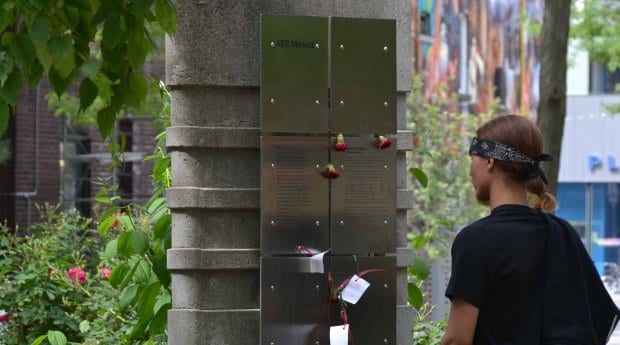Each year at a candlelight vigil in Barbara Hall Park (formerly named Cawthra Park), more names are added to a memorial for people who have died of AIDS or HIV-related complications. Since the first vigil 30 years ago, the number of people added to the list has steadily decreased because of medical advances in the treatment of HIV/AIDS, but challenges and barriers remain for people living with the illness today.
According to Todd Ross, director of community development and information services at Casey House and one of the organizers of the annual vigil, many of the people who have survived, along with their allies, make their way back to the vigil year after year.
“Pride is many things and different things to different people,” he says. “A lot of us celebrate Pride by reflecting and looking back at what has been achieved and looking ahead to the challenges.”
One of this year’s co-hosts, former Toronto mayor Barbara Hall, knows full well how far people have come since the spread of HIV/AIDS began in Toronto in the 1980s. As a lawyer, she advocated for gay men who were caught up in the 1981 police raids on bathhouses and fought to have sexual orientation included as a prohibited ground of discrimination in the Ontario Human Rights Code.
Later, as a city councillor and then as mayor, she oversaw Toronto Public Health’s response to HIV/AIDS in the city. “It’s clear that not just the city but all of society was slow in responding to HIV/AIDS,” she says, recalling that it was commonly referred to as the “gay disease.”
“The disease was not discriminating, but society did discriminate against those who had it,” she adds.
Hall’s co-host Henry Luyombya started advocating for those with HIV/AIDS in Uganda, where he was born. “I felt there was a need to get involved because I was personally affected,” he says. “HIV/AIDS was directly affecting my family.”
He looks forward to honouring the work of LGBT activists who have made his job easier. “Things have changed,” he says. “We are seeing that there is more openness and engagement around issues [such as] anti-homophobia, discrimination and AIDS-phobia.”
Luyombya is now a researcher at the Committee for Accessible AIDS Treatment, where he works on the CHAMPS project to reduce HIV/AIDS stigma in ethno-racial communities in Toronto, particularly in the black, Asian and Latin American communities.
He says a multitude of challenges still exist for people living with HIV/AIDS. For instance, because of federal cuts to the interim federal health program for refugees in 2012, many lost access to healthcare and medication coverage. “That can be very problematic for individuals who are living with HIV,” Luyombya says.
At the vigil, he hopes to raise awareness about the continued struggles faced by those living with HIV/AIDS, no matter what community they come from. “We can’t do it alone as people in the HIV movement,” he says, calling on politicians, funders and community members to learn about the disease and reduce the stigma surrounding it.


 Why you can trust Xtra
Why you can trust Xtra


